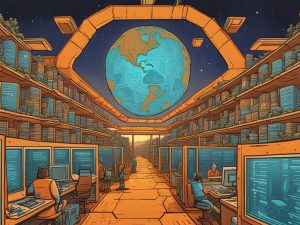The Demand for Web3 Developers Outweighs the Available Expertise
As we reflect on the evolution of the industry in 2023 and look forward to the end of the “crypto winter,” the web3 landscape is full of opportunities. However, there is a persistent issue that needs to be addressed: there is a significant demand for web3 developers, but there is a shortage of available expertise.
A Blend of Academic Insights and Technical Proficiency
To bridge this skills gap, developers need a combination of academic insights and technical proficiency. Succeeding in web3 requires not only coding skills but also a deep understanding of foundational theories such as game theory and economics. Without this balance between practical skills and theoretical knowledge, developers may struggle to navigate the vast web3 ecosystem.
Blockchain as the Cornerstone of Web3
Within web3, blockchain is the cornerstone. Developers who are proficient in languages like Solidity or Rust are in high demand, but coding skills alone are not enough. Developers lacking practical skills may face difficulties in executing essential tasks for web3 applications, such as crafting smart contracts or building decentralized apps.
The Fusion of Disciplines in Web3
The essence of web3 goes beyond coding; it involves a fusion of disciplines. Web3 developers need to understand cryptography, game theory, and different types of governance. Focusing solely on code might cause skilled coders to overlook the broader implications of their work, such as economic incentives and user behavior affecting adoption.
The Importance of Academic Rigor in Blockchain Education
Academic rigor plays a crucial role in blockchain education as it provides a solid framework for understanding the complexities of this technology. In-depth examinations of consensus mechanisms and case studies of past blockchain implementations offer valuable lessons and enhance critical thinking and problem-solving skills.
A Collaborative Approach to Closing the Skills Gap
To effectively close the web3 skills gap, a collaborative approach is necessary. Academic institutions can offer knowledge grounded in research, while industry players can provide specialized training programs, internships, and mentorship initiatives. By combining the best from academia and industry, we can equip future developers with the comprehensive skill set needed for the multifaceted demands of web3.
Hot Take: Bridging the Blockchain Skills Gap
The demand for web3 developers continues to outpace the available expertise. To address this issue, a combination of academic insights and technical proficiency is required. Developers must not only excel in coding but also understand foundational theories like game theory and economics. Additionally, they need to go beyond coding skills and grasp disciplines such as cryptography and governance. Academic rigor is vital in blockchain education to provide a solid framework for understanding this complex technology. A collaborative approach between academia and industry is necessary to close the skills gap and prepare developers for the challenges of web3.





 By
By
 By
By
 By
By
 By
By
 By
By
 By
By